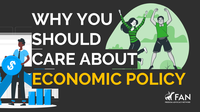
The health of an economy, which at its core is merely a system of transactions, affects your quality of life. How healthy an economy is however, is largely determined by the economic policies of a country.
Watch:
Transcript:
“It’s the economy, stupid!”
This was the winning phrase that resonated with voters and helped Bill Clinton win 1992 US presidential election campaign.
This phrase was crafted by Clinton’s no-nonsense strategist, James Carville. Carville understood that, above all, people prized their quality of life – being able to live a comfortable life of their choosing – and that this was intricately connected to the economy.
At its core, the economy is a system of transactions – people buying and selling things. The easier it is to buy and sell things, the healthier the economy and the better the quality of life.
Carville understood that if Clinton could convince voters that his economic policy would ensure a healthy economy and improve their quality of life, he would win the election. And he was right.
Economic policy determines how easy or difficult it is for people to buy and sell things.
But, like an eco-system, the economy is complex.
Just as it is neither practical nor sensible for even the smartest ecologists to try to manage weather and rainfall, or the habits of predators, migrating birds and grazing herds, so it is neither practical nor sensible for politicians and bureaucrats to try to manage who buys and sells what to whom, how, when, and where!
But just as ecologists can be effective in identifying problems – and solutions – in an eco-system, so too can policy ensure the health of the economy.
Economic policy determines how easy or difficult it is for you to afford to live a comfortable life of your choosing. Like it or not, we are directly affected by economic policy.
You have the power and right to demand good economic policy and get others to do the same.
Your freedom is worth fighting for. Join FAN today to build a new tomorrow.
Illustration sources used available here.
